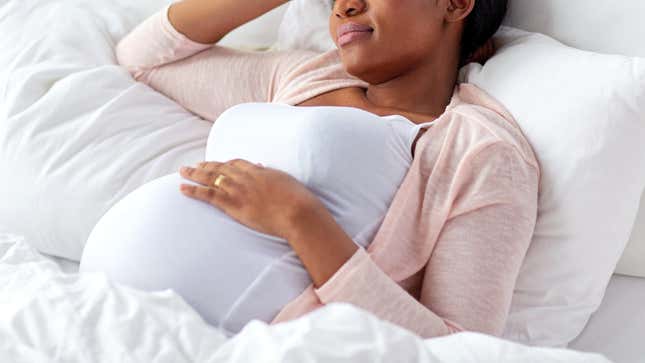
No one should mandate what a pregnant person does with their body, but when it comes to vaccinations against the coronavirus, the advice is clear: Vaccinations provide the best protection against infections that can endanger the lives of both parent and child.
The recent surge of the highly contagious Delta variant has compelled the Centers for Disease Control and Prevention (CDC) to double down on recommendations made in April that pregnant and lactating people be inoculated with the COVID vaccine. The two leading organizations for specialists in obstetric care, the American College of Obstetricians and Gynecologists (ACOG) and the Society for Maternal-Fetal Medicine (SMFM), have made similar recommendations, but to date, the CDC reports only 23 percent of this group has received even a single dose.
As reported by The Cut, “The outcomes of severe coronavirus infections in pregnant people can be devastating for parent and baby alike, from escalated risk of hospitalization, intubation, and death to preeclampsia, premature birth, and even stillbirth.” Sadly, those outcomes parallel those in America’s ongoing maternal health crisis, which, like the coronavirus, has disproportionately affected Black and Latinx populations—and as of May of this year has shown no improvement, despite heightened awareness and activism.
As a data from the Blue Cross Blue Shield Association’s (BCBSA) “Health of America” report indicated (via a May press release shared with The Root):
While rates of severe maternal morbidity (SMM) have continued to increase among all women since 2018, “disparities in maternal health are so severe that young Black women are at greater risk for childbirth complications than older white women considered high risk (after turning 35),”
So too, are the racial disparities in vaccination rates among pregnant individuals. In fact, though data indicates that people who are pregnant have a 70 percent higher risk of dying from COVID than those who are not (h/t Miami Herald), according to the CDC: “As of May 8, 2021, 16.3% of pregnant women identified in CDC’s Vaccine Safety Datalink had received ≥1 dose of a COVID-19 vaccine during pregnancy in the United States. Vaccination was lowest among Hispanic (11.9%) and non-Hispanic Black women (6.0%) and women aged 18–24 years (5.5%).”
Despite the staggering rate of new transmissions and growing evidence that the currently available vaccines, while not entirely preventative, are highly protective against severe infections, vaccine hesitancy has proven a significant obstacle, both in stemming the spread of COVID-19 and the evolution of progressively more threatening variants. As The Cut rightly notes, pregnant people are understandably more hesitant than most to get the shot—even as they account for an increasing number of infections.
[A]mong pregnant people, anxiety about putting a “new” medicine in their bodies seem to have had a chilling effect. The available data does not bear out these concerns: A study of over 2,400 pregnant, fully vaccinated participants — who received either Moderna, Pfizer, or BioNTech during their first 20 weeks — found miscarriage rates remained the same as for the general population, affirming previous research on people vaccinated in later trimesters. Similarly, a study of 827 vaccinated, pregnant patients suggested that immunization against COVID does not raise the risk of adverse outcomes before, during, or after birth—neither for the parent nor the infant.
The California Health Report agrees:
The science is there to prove safety, including a new study just released in the New England Journal of Medicine that looked at 35,691 pregnant participants between the ages of 16 and 54. The study showed that the mRNA vaccine for COVID-19 is not associated with any increase in adverse events to new mothers or infants when compared to their pre-pandemic non-vaccinated counterparts.
Again, we hold the belief that it is no one’s prerogative to tell a pregnant person what to do with their body—or even to insist they remain pregnant, if that isn’t their desire. But as Black and Latinx populations are already the most vulnerable to both the coronavirus and negative birth outcomes, the available research should be cause for serious consideration among expectant parents. As Sascha R. Ellington, epidemiologist and team lead for the emergency preparedness response team in the CDC’s division of reproductive health told the New York Times (h/t The Cut).“The benefits of vaccination, and the known risks of COVID during pregnancy and the high rates of transmission right now, outweigh any theoretical risks of the vaccine.”

